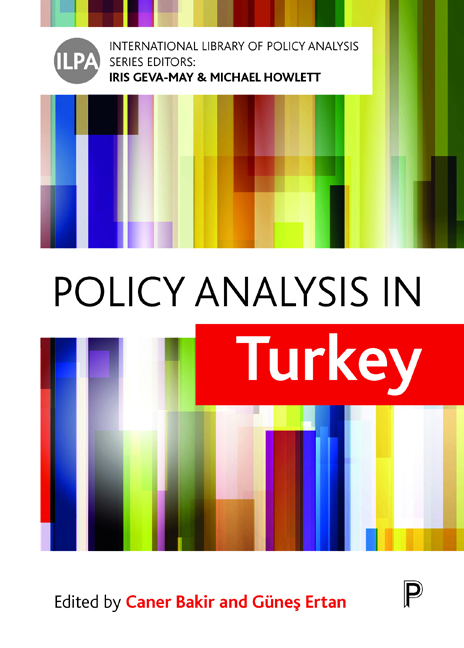Book contents
- Frontmatter
- Contents
- List of tables and figures
- Notes on contributors
- Editors’ introduction to the series
- one Pushing the pendulum from politics to policy: the state of policy analysis in Turkey
- Part One Historical roots, styles and methods of policy analysis in Turkey
- Part Two Policy analysis by governments
- Part Three Experts, international actors and public opinion
- Part Four Parties and civil society-based policy analysis
- Part Five Academic, bureaucratic and advocacy-based policy analysis
- Index
three - ‘Boomerang effect’: the bottleneck of public policy analysis in Turkey
Published online by Cambridge University Press: 19 April 2022
- Frontmatter
- Contents
- List of tables and figures
- Notes on contributors
- Editors’ introduction to the series
- one Pushing the pendulum from politics to policy: the state of policy analysis in Turkey
- Part One Historical roots, styles and methods of policy analysis in Turkey
- Part Two Policy analysis by governments
- Part Three Experts, international actors and public opinion
- Part Four Parties and civil society-based policy analysis
- Part Five Academic, bureaucratic and advocacy-based policy analysis
- Index
Summary
Introduction
A boomerang is a thin, hardwood missile that was originally designed to kill animals and return in a circle to its thrower. If thrown without skill, however, it can recoil on the thrower, wounding them. This boomerang metaphor can be used to explain why the Turkish Justice and Development Party (AKP) has disregarded or even prevented the use of public policy methods and techniques that it introduced in the first period of its rule, when it was enthusiastic in introducing policy tools such as strategic planning and performance audits to increase the efficiency, effectiveness and economy of Turkish public organisations. Soon after their implementation, the published evaluation reports of the Court of Accounts revealed the government's poor performance. Opposition groups in Turkey have criticised the government on the basis of the evidence provided in these reports. Thus, the AKP took legal measures to restore or even reverse the public policy evaluation system within a very short period of time.
When the AKP, led by Recep Tayyip Erdoğan, took office in 2002 ending the long period of coalition governments, the government promised to undertake the most comprehensive public administration reform in the history of Turkey. Although most of its cadres were part of the Islamic political movement, the party declared itself as conservative democratic, representing the Turkish centre right (Celenk, 2009, p 49; see also Akdoğan, 2003). Supported by broad segments of society, the party's first goal was to end the economic crisis. For this purpose AKP welcomed the technical and financial assistance of international economic organisations such as The World Bank and the International Monetary Fund (IMF). It undertook a neoliberal reform policy that enabled Turkey to access foreign loans that it desperately needed.
International financial loan agreements signed with the IMF and World Bank assisted the transfer of public policy analysis tools and instruments (Kocak, 2010, p 13). These loans were conditional on the realisation of public administration reforms and the transfer of public policy tools associated with these reforms such as strategic planning, performance auditing, regulatory impact analysis, and so on (Celenk, 2009, p 49). AKP full-heartedly accepted a new reform paradigm in public administration, and attempted to create a flexible, market-based form of public management by transforming the ‘rigid, hierarchical, bureaucratic form of public administration’ (Hughes, 1994, p 1).
- Type
- Chapter
- Information
- Policy Analysis in Turkey , pp. 35 - 50Publisher: Bristol University PressPrint publication year: 2018



